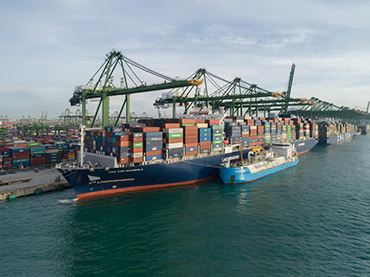Written Reply by Minister of Transport Mr S Iswaran to Parliamentary Question on Statistics and Trends in Relation to Ships Calling at Ports of Singapore to Refuel and Plans to Boost Singapore's Status as Bunkering Hub
09 May 2022In Parliament
Mr Saktiandi Supaat asked the Minister for Transport
a. what are the statistics and trends in relation to ships calling at the ports of Singapore to refuel, as well as bunker fuel sales by value or amount;
b. whether any studies have been done to identify the causes of any trends, including how delays in China's ports are causing vessels to skip a stopover in Singapore; and
c. how Singapore intends to maintain and further boost its status as a bunkering hub.
Reply by Minister for Transport S Iswaran:
1. The Maritime and Port Authority of Singapore (MPA) tracks vessel arrivals, bunkering operations and bunker sale volumes as indicators of our bunkering hub's competitiveness.
2. The number of ships that called at the Port of Singapore for refuelling decreased by 13% from 10,294 in the first quarter of 2021 to 8,940 in the first quarter of 2022; and the total bunker sale volumes decreased by 12% from 12.8 million tonnes to 11.3 million tonnes.
3. Based on industry feedback, this decline is driven by two factors: higher crude oil prices globally which reduce overall bunker demand; and congestion at other ports around the world due to supply chain delays.
4. Congestion at overseas ports results in ships burning fuel while waiting to load or unload cargo. Some ships have decided to refuel while they wait at these upstream ports.They either choose not to refuel at Singapore or end up purchasing less fuel when they subsequently call at the Port of Singapore.
5. To keep Singapore competitive as a global bunkering hub, we will continue to enhance the efficiency and reliability of our bunkering operations while preparing the marine fuels sector for a multi-fuel bunkering transition. MPA has provided close to S$3 million in funding for eight projects to accelerate the development of secured digital and automated workflows for bunkering document submissions, regulatory reporting and bunkering data transmission, and to optimise terminal and bunker craft scheduling and utilisation.
6. We are also preparing the Port of Singapore for a multi-fuel transition to remain future-ready as the shipping industry invests in new technology to lower its carbon emissions. We started the supply of Liquified Natural Gas bunker from truck-to-ship in 2017 and from ship-to-ship in 2021. MPA is also supporting trials with industry partners to facilitate the development of biofuels for ocean-going ships.
7. MPA and 14 private sector partners have established the Global Centre for Maritime Decarbonisation to help the maritime industry reduce its carbon emissions by shaping standards, piloting green fuels for international shipping and deploying technologies such as shipboard carbon capture, storage and utilisation.
Back
a. what are the statistics and trends in relation to ships calling at the ports of Singapore to refuel, as well as bunker fuel sales by value or amount;
b. whether any studies have been done to identify the causes of any trends, including how delays in China's ports are causing vessels to skip a stopover in Singapore; and
c. how Singapore intends to maintain and further boost its status as a bunkering hub.
Reply by Minister for Transport S Iswaran:
1. The Maritime and Port Authority of Singapore (MPA) tracks vessel arrivals, bunkering operations and bunker sale volumes as indicators of our bunkering hub's competitiveness.
2. The number of ships that called at the Port of Singapore for refuelling decreased by 13% from 10,294 in the first quarter of 2021 to 8,940 in the first quarter of 2022; and the total bunker sale volumes decreased by 12% from 12.8 million tonnes to 11.3 million tonnes.
3. Based on industry feedback, this decline is driven by two factors: higher crude oil prices globally which reduce overall bunker demand; and congestion at other ports around the world due to supply chain delays.
4. Congestion at overseas ports results in ships burning fuel while waiting to load or unload cargo. Some ships have decided to refuel while they wait at these upstream ports.They either choose not to refuel at Singapore or end up purchasing less fuel when they subsequently call at the Port of Singapore.
5. To keep Singapore competitive as a global bunkering hub, we will continue to enhance the efficiency and reliability of our bunkering operations while preparing the marine fuels sector for a multi-fuel bunkering transition. MPA has provided close to S$3 million in funding for eight projects to accelerate the development of secured digital and automated workflows for bunkering document submissions, regulatory reporting and bunkering data transmission, and to optimise terminal and bunker craft scheduling and utilisation.
6. We are also preparing the Port of Singapore for a multi-fuel transition to remain future-ready as the shipping industry invests in new technology to lower its carbon emissions. We started the supply of Liquified Natural Gas bunker from truck-to-ship in 2017 and from ship-to-ship in 2021. MPA is also supporting trials with industry partners to facilitate the development of biofuels for ocean-going ships.
7. MPA and 14 private sector partners have established the Global Centre for Maritime Decarbonisation to help the maritime industry reduce its carbon emissions by shaping standards, piloting green fuels for international shipping and deploying technologies such as shipboard carbon capture, storage and utilisation.
